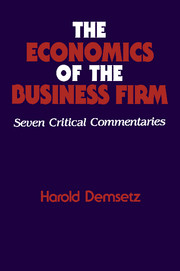Book contents
- Frontmatter
- Contents
- Preface
- First commentary: The firm of theory: its definition and existence
- Second commentary: Agency and nonagency explanations of the firm's organization
- Third commentary: Enterprise control, wealth, and economic development
- Fourth commentary: Profit maximization and rational behavior
- Fifth commentary: The use and abuse of accounting profit data
- Sixth commentary: Management compensation and tournament theory
- Seventh commentary: The intensity and dimensionality of competition
- References
- Index
Fourth commentary: Profit maximization and rational behavior
Published online by Cambridge University Press: 06 July 2010
- Frontmatter
- Contents
- Preface
- First commentary: The firm of theory: its definition and existence
- Second commentary: Agency and nonagency explanations of the firm's organization
- Third commentary: Enterprise control, wealth, and economic development
- Fourth commentary: Profit maximization and rational behavior
- Fifth commentary: The use and abuse of accounting profit data
- Sixth commentary: Management compensation and tournament theory
- Seventh commentary: The intensity and dimensionality of competition
- References
- Index
Summary
Do real firms maximize profit? The answer to this question is sure to please some and disappoint others. Those who see unhealthy greed in profit maximization are unlikely to react to an answer in the same way as those who see healthy incentives. As we have seen in the first commentary, profit maximization is a logical consequence, under conditions of full knowledge of prices and technologies, of assuming that firms produce only for outsiders. Maximizing profit in this context makes no claims about the degree to which owners of firms behave in charitable, altruistic fashion when making decisions from within their households. The lack of desire to maximize profit and/or the failure to maximize profit require that the firm not be a specialized production unit or that it not have full and perfect information available to it. Outside the rarified context of the perfect competition model, and surely in the firm of the real world, these requirements would seem to be met; this makes the question of profit maximization raise issues of substance.
These issues are important too. Attacks on profit maximization carry implications that extend beyond pure science. Normative issues are imbedded. The influential book by Berle and Means (1933) has as its full title The Modern Corporation and Private Property. Private property is tagged on to the title because Berle and Means believe that profit maximization supplies the social justification for private property and that the corporation, in failing to maximize profit, undermines this justification. From the perspective of neoclassical economic theory, the private ownership of firms creates powerful profit-linked incentives that guide owners to minimize the cost of producing any given quantity of good; this minimal production cost benefits all society because competition between private owners of firms forces prices down to the levels of these costs.
- Type
- Chapter
- Information
- The Economics of the Business FirmSeven Critical Commentaries, pp. 61 - 91Publisher: Cambridge University PressPrint publication year: 1995



